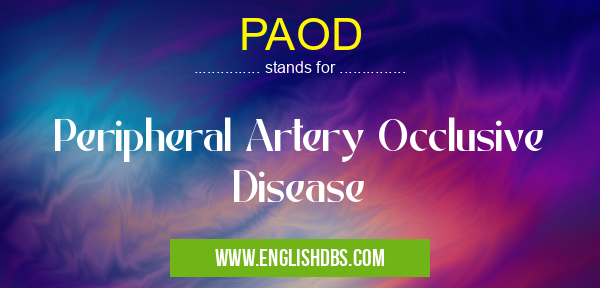What does PAOD mean in DISEASES
Peripheral Artery Occlusive Disease (PAOD) is a condition in which the arteries that supply blood to the organs and limbs become blocked or narrowed. This narrowing of the arteries restricts blood flow, leading to symptoms such as pain, fatigue, and numbness. PAOD can be caused by a variety of medical conditions and lifestyle factors.

PAOD meaning in Diseases in Medical
PAOD mostly used in an acronym Diseases in Category Medical that means Peripheral Artery Occlusive Disease
Shorthand: PAOD,
Full Form: Peripheral Artery Occlusive Disease
For more information of "Peripheral Artery Occlusive Disease", see the section below.
Essential Questions and Answers on Peripheral Artery Occlusive Disease in "MEDICAL»DISEASES"
What causes PAOD?
PAOD can be caused by a variety of medical conditions and lifestyle factors, including diabetes, smoking, high cholesterol levels, obesity, and sedentary lifestyle. Other risk factors include age, sex, ethnicity/race, family history of cardiovascular disease, hormone therapy medications for menopause, high blood pressure, elevated C-reactive protein (CRP), and use of oral contraceptives.
Are there any treatments available for PAOD?
Yes. Treatment options for PAOD may include lifestyle changes such as exercising regularly and making dietary changes; medication to reduce inflammation; minimally invasive procedures such as angioplasty or stent placement; surgical bypass surgery; amputation in cases where tissue has been irreversibly damaged due to lack of blood flow; or vascular reconstruction (revascularization) surgery.
What are the signs and symptoms of PAOD?
Common signs and symptoms of PAOD include leg pain when walking (claudication), coldness or color changes in the legs and feet due to reduced circulation in that area; loss of hair on the legs; non-healing wounds or ulcers on feet or toes; numbness or tingling in lower extremities; weak or no pulse in feet or lower legs; reduced muscle size or bulk in extremities (atrophy); irregular heartbeat (arrhythmia); dizziness during exercise; erectile dysfunction; toe deformity (hammertoe).
What should I do if I think I have PAOD?
If you think you have symptoms associated with Peripheral Artery Occlusive Disease (PAOD), it is important to speak with your doctor right away so that they can assess your individual risk factors and recommend appropriate treatment options based on your specific situation.
Is there any way to prevent getting PAOD?
Yes. You can reduce your risk of developing Peripheral Artery Occlusive Disease by maintaining a healthy weight through regular exercise and a balanced diet low in saturated fat. Avoiding smoking is also important for preventing this condition. Additionally it's wise to get regular check-ups with your doctor so that potential medical issues can be monitored over time.
Final Words:
Peripheral Artery Occlusive Disease (PAOD) is a serious condition characterized by obstructions which impede blood flow from reaching organs and limbs. In order to prevent developing this condition it is essential to maintain an overall healthy lifestyle including eating nutritious meals frequently exercising regularly avoiding smoking get regular check-ups with your doctor identifying symptoms quickly speaking with your doctor at first sign of possible issue understanding various treatment options available seeking out appropriate treatment option based on individual needs following all treatment instructions given by healthcare practitioner.
